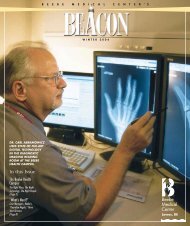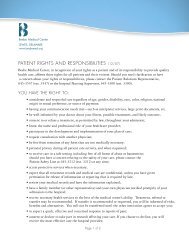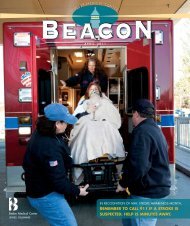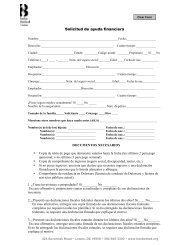BEACON â Winter 2005 - Beebe Medical Center
BEACON â Winter 2005 - Beebe Medical Center
BEACON â Winter 2005 - Beebe Medical Center
Create successful ePaper yourself
Turn your PDF publications into a flip-book with our unique Google optimized e-Paper software.
KNOWLEDGE IS POWER<br />
MARCH IS COLON CANCER AWARENESS MONTH<br />
If someone told you that taking a test twice a decade at most could be the<br />
difference between life and death, would you take the test<br />
HAVE YOU HAD A COLONOSCOPY<br />
Colon cancer, which is greatly preventable, is the second leading cause of cancer<br />
death in the United States affecting men and women equally. It is a particular threat<br />
to African Americans. Less than half of all Americans over age 50 have had colorectal<br />
cancer testing, according to the American Cancer Society. Tens of thousands of lives<br />
could be saved each year with one tool: the colonoscopy.<br />
The colon is a muscular tube about five feet long that is responsible for<br />
pulling water and nutrients from food. Colon cancer is abnormal cell<br />
growth in parts of the body including the colon and rectum. During a<br />
colonoscopy, polyps, or growths in the bowel that may become cancer,<br />
can be removed without having an additional procedure. Unlike other<br />
diagnostic or screening tools, a colonoscopy can help prevent colon cancer.<br />
“Colon cancer is actually preventable and highly treatable when found early,”<br />
stresses Dr. Robert Deckmann, a gastroenterologist and chief of medicine at <strong>Beebe</strong><br />
<strong>Medical</strong> <strong>Center</strong>.“Precursor lesions, or polyps, usually have no symptoms. There’s no<br />
other way to detect them than to look inside.”<br />
Dr. Deckmann recommends a colonoscopy every 5 years beginning at age 50,<br />
unless a first-degree family member, such as a parent or sibling, has had colon cancer<br />
at an age under 60. Since heredity does play a role in colon cancer, testing should be<br />
initiated at a younger age. Several tests exist to screen for polyps, such as a barium<br />
enema in conjunction with a flexible sigmoidoscopy or a virtual colonoscopy.<br />
This potential for prevention is the distinction between colon cancer and other<br />
cancers.“When you perform a breast or testicular self-exam, you are not looking for<br />
something that will develop into cancer—you are looking for cancer,” Dr. Deckmann<br />
explains.“During a colonoscopy, you are looking for a precursor to cancer (a colon<br />
polyp) and have an opportunity to prevent it right then and there.”<br />
While it is unusual to find cancer in a routine colonoscopy in someone without<br />
symptoms, which could include blood in the stool, pain, constipation, and weight<br />
loss, it is very common to find polyps.<br />
Surgeon Dr. Clara Higgins, of Lewes, screens Pat Crowe for suspicious spots<br />
which may be an indication of skin cancer.<br />
Joe Nagy, of Milton, is a colon cancer survivor and avid surf fisherman.<br />
8








